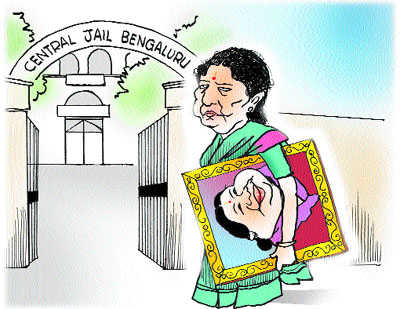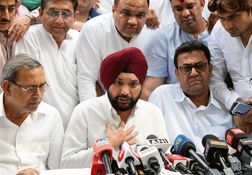
Illustration: Sandeep Joshi
Harish Khare
Tamil Nadu has a new chief minister. And the new chief minister's name is not VK Sasikala. Even if the new man, Edappadi K Palaniswami happens to be a Sasikala proxy, the Indian democracy has something to celebrate. A judicial intervention has stopped a power grab in its tracks. Instead of lording over the secretariat at Chennai, Ms Sasikala now has to do with the crowded quarters in cell number 9234 in Bengaluru Central Prison. Why this sense of relief?
Over the decades the Indian democracy has indeed become inured to many aberrations and absurdities. After all, we have had the spectacle of a Rabri Devi presiding over Bihar, in circumstances somewhat similar to what prevailed after Jayalalithaa's death. We have the family format now firmly consecrated. The Chautalas, the Badals, the Muftis, the Abdullahs, the Gandhis, the Deve Gowdas, the Karunanidhis, the Lalu Yadavs, and many other aberrations have mocked our democratic pretensions. Yet there was something so blatant, so ignominious in the Sasikala's chief ministerial push that it disturbed our collective equanimity. Rabri Devi was 1997; 20 years later, we do not feel we need to countenance 'a chief minister Sasikala'. Have we not evolved as a polity? Has our democracy not deepened these last two decades? Why was the sense of a cheapening of our democracy felt so acutely, not just in Tamil Nadu but across the land?
Maybe we were offended because Ms Sasikala sought to extend the principle of ‘family’ to ‘household’ control. Her only claim to the AIADMK leadership was/is that she was a trusted aide and a confidante of “Amma” and, therefore, was best equipped to carry forward the revolutionary leader’s legacy. Suddenly, we felt our democratic sensibilities violated. Irrespective of whatever help and assistance and comfort she provided to Jayalalithaa in the privacy of the Poes Garden, this companionship did not qualify her for a public role. What the country witnessed was how an established political party, with a sizeable presence in the two Houses of Parliament, had got reduced to a den of intrigue and conspiracy. All of a sudden we understood that why our political parties have become so devoid of legitimacy and respectability.
Admittedly, Tamil Nadu is no stranger to this household syndrome. Not long ago, the Karunanidhi household had produced its own script of warring sons, greedy cousins, rapacious daughters, formal and informal wives, each more wayward than the other, each extracting corrosive rent from the formal structure of government. That type of family control and its collateral benefits were deemed 'normal' and acceptable. But the stench could be smelled all the way up in New Delhi. The DMK's first family can claim the dubious honour of blue-printing this family control and command model. The only redeeming aspect of the Karunanidhi clan was that its major honchos got themselves sanctified and certified in the electoral arena.
Despite this familiarity was the family nexus, there was something deeply disagreeable about Sasikala's hijacking of the AIADMK leadership. It is bad enough that political parties stand reduced to family heirlooms, but a profound transformation was inflicted in converting a political outfit into a household arrangement. And it was her chief ministerial putsch that got our democratic goat. As has been pointed out by every sensitive observer, Ms Sasikala has had no experience of public or political life. As part of the Jayalalithaa household she may have domain knowledge of the AIADMK’s internal affairs but these limited encounters in intrigue and conspiracy could not make up even remotely for her total unfamiliarity with the rites and obligations of public office. Whatever trust or confidence Jayalalithaa reposed in this domestic impresario could not be deemed as certificates of competence for a chief ministerial innings.
This narrow escape should also make us re-state the meaning and purpose of an electoral ‘mandate.’ In this time and age of democratic discontent no leader or a political party can claim that a certain number of seats in the Vidhan Sabha/Lok Sabha bestows a licence for experiments in authoritarianism. Political parties in India are beyond the reach of most institutional arrangements of accountability. Sasikala could come so close to a total usurpation of the chief ministerial gaddi because as a political party the AIADMK is beyond public scrutiny. Henceforth, this immunity would need to be justified and located in public good.
And, it also follows that just because a ‘leader’ is successful in leading a political party to victory at the hustings does not necessarily mean that he or she be granted god/goddess-like reverence and obeisance. No chief minister or prime minister need be elevated beyond the democratic mortal ordinariness. Nor does a victory in an election give to anyone a mandate to subvert the established procedures of decision-making and lawful conduct of authority.
Tamil Nadu is a good example of governing arrangements being reduced to rogue operations. It is no consolation that the DMK and the AIADMK could take turns in allowing their leaders, cadres and activists to inflict unhappiness on the citizens. Time has come to note that such delinquencies go unchallenged only because the bureaucracy becomes an enabling agent. Had the Sasikala chief ministerial gambit come to pass, she would have not had any difficulty in securing the requisite acquiescence of a handful of IAS and IPS officers and their state-level counterparts. This nexus has to be smashed, not just in Tamil Nadu but all over India and in New Delhi as well.
No one can foresee whether the new chief minister of Tamil Nadu would allow himself to be dictated to by the Sasikala-aligned mafia. But it must be devoutly hoped by one and all that trappings and pomp of the office would make the worm turn, sooner than later. Any attempt to govern decently and reasonably would garner its own public goodwill and support — two basic ingredients in good governance. Civil society has found its voice and it must not allow itself to be shut down by the new goons.
Perhaps it is possible to suggest that we are entering an inflection phase in our national political life. In a changing India we seem ready to demand that political arrangements justify themselves in terms larger and nobler than just a will of the ‘leader’ or the 'demand of the cadres' or the ‘internal affairs’ of a party. It is inevitable that sooner or later our democratic energy and vibrancy would demand that the political parties become an institution of popular aspiration rather than a handmaiden of private control and command. This Tamil Nadu spasm has painful lessons way above the Deccan plateau.
























